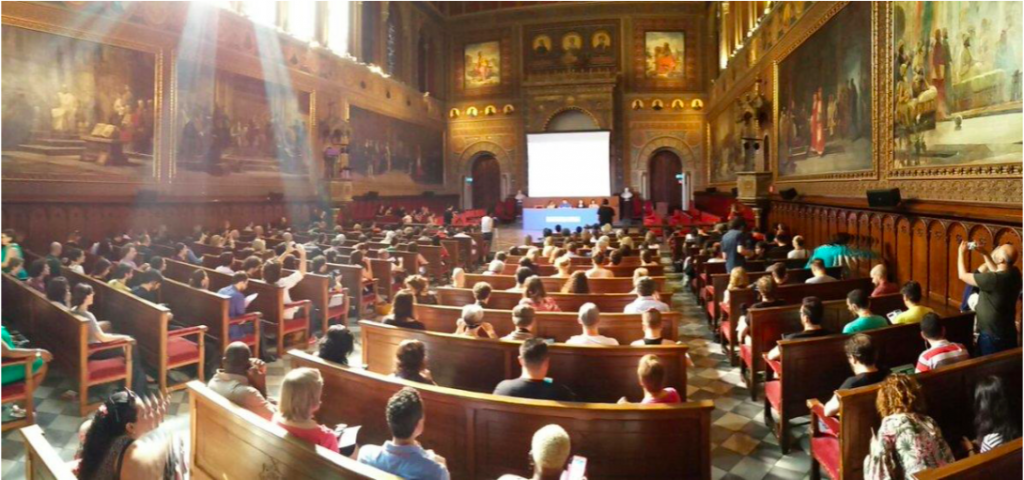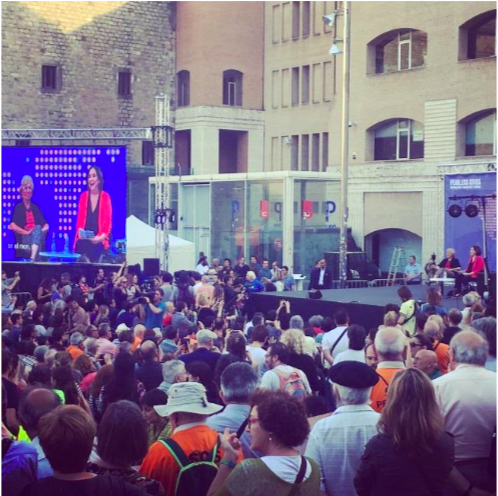Written by Vivian Paulissen, knowledge manager of European Cultural Foundation
Together! That was the feeling the event provoked: we are together and together we can fix it. Radical participation of citizens (I refer here to citizens as inhabitants, regardless of legal status) is the key of good democracy. ‘Doing It Together’, in solidarity that is. According to the municipalists it’s the only way to restore dignity and overcome inequality, patriarchy, destructive extractivism, fragmentation and divide.

Solidarities of Diversity
Fatima Taleb, first muslim Councilor for Participation of Badalona, a municipality of 265.000 inhabitants with many different cultural, ethnic and religious backgrounds, worked for over fifteen years in mediation, diversity management and conflict resolution. In the panel session about neo-liberalism and feminism she spoke about politics of proximity and diversity as a crucial element of change. A movement is made by people and where people are, there is diversity. Living together in diversity does also embody conflict. We need to acknowledge that the best way to deal with this is on the local level, the level where there is proximity and solidarity is best built.
The revolution does not happen if it is not a feminine one, claimed the mayors and councilors at the opening evening. The principle holds mechanisms for inclusivity in general: who is in and who is out, is carefully considered in the operational structure of Barcelona en Comú. This party works with representative pairs, consisting of one woman and one man (according to a key principle of the MST, the Landless Worker’s Movement in Brazil) and facilitates co-responsibility. Digital participation is strongly encouraged and evening meetings allow people with day jobs to nevertheless influence the municipal agenda and governance. These measures replace traditional verticality of organizing.
This and the other key ideas of municipalism were summarised by Xavi Ferrer and Kate Sheabird, the international coordinator pair of Barcelona en Comú: the local base is essential; people need the ability to make decisions about their own life; there must be accountability on all levels and we have to include people who are in and outside of the institutions in a fabric of collaboration.
Vandana Shiva, last and ultimate speaker, synergized all that matters in a moving speech that entailed analysis, poetry, vision, philosophy and activism. She referred to the three main characteristics of all life as being intelligence, diversity and self- organization: here you have the recipe of successful municipalism. “What we need is solidarities of diversity,” concluded Vandana Shiva.
Refugees Welcome
Marcelo Esposito, artist and Deputy of Congress for the coalition of En Comú Podem, said: “Yes, there is fear, but we are with many! We must come up with a viable alternative narrative of inclusion.”
Unfortunately however, there was no time for one of the three planned discussions in the policy round table on refugees: exactly the one on narratives and the role of media and representation. As a cultural foundation this is a key area of our work: how can we build a fresh, inclusive narrative, representation and imagery with the participation of all? We still talk a lot about “them” as in categories of silo-ed or interchangeable identities: “refugees”, “migrants” for example.
A representative from the New York Council spoke about the notion of the Sanctuary City and how they campaign and inform citizens and reduce the fear of deportation among people who are in the country illegally. Berlin was referred to as Solidarity City. It mobilized 10.000 people on the streets after the opening of the borders in Germany by Merkel in 2015, which, ironically at the same time meant stricter deportation laws. The demonstration did not result in successful action though.
The food for thought brought by these cases is that we need to challenge our discourse; we need to avoid parallel cities (thus ensuring the same rights for everyone!); we need to shift from charity to practical solidarity; undo governance that criminalizes survival and challenge national responsibility. On the latter; a city can break alliances between the national states and the EU by building tactical alliances itself with the EU, which has happened in the case of Barcelona. Or self-organize the living together of newcomers and earlier residents as in many villages and cities across Europe.
The Commons

The Commons as a political paradigm stands as the core of the municipalist movement, so it obviously resulted in a huge representation of commons activists at the Fearless Cities Summit (the Peer-to-Peer Foundation, Remix the Commons, the Croatian Institute for Political Ecology, the Catalan platform Pro Comuns to name few of them, a lot are also active in the European Commons Assembly process).
Iolanda Fresnillo of Ekona Barcelona talked about how the urban commons should be governed from the citizens’ point of view. We have reached the limits and the failure of public – private partnerships. Public – communitarian pacts are the new institutions of collective action that are
built on social relations in principle: from economic efficiency to social efficiency! “We need a democratic city, not a smart city.” Municipalist sets of policies will favor the open-source peer- to-peer technologies which empower practices of commoning over the traditional delegation to gigantesque transnational corporates.
The most advanced cities also try to set up lasting and resilient infrastructures of a real collaborative and regenerative economy. In most cases a local complementary currency is being created or backed up by the local government to strengthen the relocalization of the economic flows.
Through these local experiments, the municipalist movement stands at the avant-garde of a new progressive political framework and convergence based on Openness (e.g. Pirate parties), Fairness (e.g. New Left) and Sustainability (e.g. Green parties) as stated by the P2P Foundation in their recent blog: “Commons in the time of monsters: How P2P Politics can change the world, one city at a time”. From local systemic alternatives the Fearless Cities are slowly driving us to a deep and post-capitalist systemic change.
How to create a municipalist platform? Do-s and Don’t-s
Kali Akuno, movement leader from Jackson, Mississippi explained the five principles of a transition city: it is a solidarity city, a Fab city, a sustainable city, a human rights city and a workers city. Its organizing strategies are about building bases to create co-ownership. This is only possible through participation and the building of cross-platforms (across unions, ngo’s, individuals, cultures, religions, gender).
Then, don’t separate the bottom up struggles from the governance; don’t make the story too complex, invest in permanent education and sharing, don’t stay in the smaller group and exclude someone if she or he does not agree. And have a long breath!
Naomi Klein appeared with an oneliner on skype: “We have to win where we can”. The city is where the violence is the most evident, so it’s at that local level we have to deal with it. “It’s easier for us, we know the space. If we can’t develop participatory organizing and decision making on the local level, we can’t do it anywhere” said Kate and Xavi in the wrap up session.
What’s culture got to do with this all? Mer from South Sudan, now living in Basel after having spent years in different asylum centers across Europe, stood up at the party, grabbed the guitar and the microphone and joined the Brazilian musicians on stage. Her songs were a fearless and political appeal for justice and above all of this, her voice was of a rare beauty, touching hearts. The next day I spoke to Mer after the policy round table on refugees. She had asked in the session how we will address the mental state of people living in indignity. No one answered the question and it bothered me, thinking that this perhaps is the crux, the most crucial point to tackle in the coming years or decades. More traumatized people will be living in our cities in the near future, and what do we do about their mental healing, who will care? Can culture be of significance here?
Mer says that’s why she sings in the refugee camps, to express, care and give comfort. Through her voice people feel they will be heard and that they are not alone. Mer symbolizes how culture can contribute to our societies: living together is not only about fearlessness, participation or activism. It comes too with imagination and beauty, with courage and independent critical thinking.
Mer should continue to sing – not only in the camps, but for all of us, so we are reminded to keep asking ourselves the right questions, because hey, aren’t we in this together?
—-
ECF contributed to the translation and documentation of the Fearless Cities Summit, as part of an EDGE Funders Alliance joint support, together with the Charles Léopold Mayer Foundation, OSIFE, Guerrilla Foundation, Ford Foundation, Chorus Foundation, Grassroots International, Karibu Foundation. For more information on EDGE and some other Fearless Cities blogs by funders, click here.
